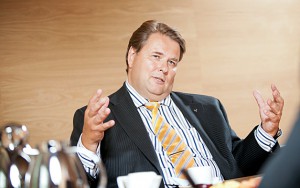 “Europeans are traditionally very good at creating new technologies, but our weakness is commercialization. Europe must put more emphasize on turning the research results into innovation. Overregulation is also a serious challenge for the European Union”. To say it in this interview with Il Bioeconomista is Ilkka Hämälä, CEO of Metsä Fibre, a world leading producer of softwood pulp and one of the main player of the bioeconomy in the European Union. Waiting for EFIB, the European Forum for Industrial Biotechnology and the Bioeconomy – which will take place next October 27-29 in Brussels – Il Bioeconomista will host a series of interviews with CEOs, who will be guest speakers in Brussels. Today we offer the first.
“Europeans are traditionally very good at creating new technologies, but our weakness is commercialization. Europe must put more emphasize on turning the research results into innovation. Overregulation is also a serious challenge for the European Union”. To say it in this interview with Il Bioeconomista is Ilkka Hämälä, CEO of Metsä Fibre, a world leading producer of softwood pulp and one of the main player of the bioeconomy in the European Union. Waiting for EFIB, the European Forum for Industrial Biotechnology and the Bioeconomy – which will take place next October 27-29 in Brussels – Il Bioeconomista will host a series of interviews with CEOs, who will be guest speakers in Brussels. Today we offer the first.
Interview by Mario Bonaccorso
How important is industrial biotechnology to support the development of your company?
Conversion of wood into our main product, pulp, requires the use of a multitude of different technologies, including biotechnology. Most notably biotechnology is used in clean-up of the process waters before returning them to nature. Biotechnology could also be applied in the conversion of various side-streams into biofuels. This is something our R&D team is looking into.
France and Spain have announced their strategic plan for the bioeconomy by the end of the year. How important are – from your point of view as CEO of an important bioeconomy player – national plans to promote the development of the bioeconomy?
Finland published a national bioeconomy strategy in 2014 and the new government, active since May this year, is currently setting up actions to promote bioeconomy development in Finland. Although Metsä Fibre is acting globally, we have our basic operations in Finland and the local business environment is thus of high importance to us. For instance, without proper road and railway systems we will not get our raw material, wood, transported from the forests to the factory sites. Having the transportation infrastructure in shape is typically the responsibility of the state. Availability of public R&D funding is also vital. We aim to develop our current processes and models, and also come up with new processes. Public R&D co-funding is accelerating this development.
Europe, Asia, America. Where is it better to invest today for a bioeconomy company?
The answer depends mainly on your position in the value chain or value network. As Metsä Fibre is very dependent on stable wood supply, we have our factories close to the forests. Our customers, for instance in the tissue paper business, are typically building their factories closer to the consumers. The investment climate also impacts the selection of region or continent.
What measures are still lacking in the European Union to foster the development of the bioeconomy?
Europeans are traditionally very good at creating new technologies, but our weakness is commercialization. Europe must put more emphasize on turning the research results into innovation. Overregulation is also a serious challenge for the European Union. In today’s global competition one must follow very closely the regional competitiveness shifts. High level of regulation makes the business environment unattractive, resulting in investment being made elsewhere, outside Europe.
In October you will participate at EFIB. What are your goals?
I come to EFIB to hear the latest in terms of EU-level trends, as well as to network.
Source
Supplier
Share
Renewable Carbon News – Daily Newsletter
Subscribe to our daily email newsletter – the world's leading newsletter on renewable materials and chemicals











